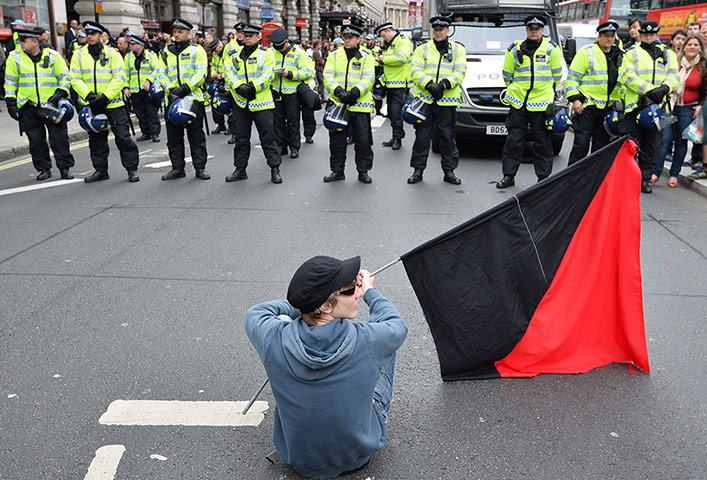
On Sunday June 9 I was calmly discussing anarchism and spirituality with a group of comrades at the Stop G8 convergence centre at 40 Beak Street, London.
Two days later the place was being invaded by a brutal army of uniformed state thugs, determined to extinguish any small glimmer of resistance in the heart of Babylon.
Later, hundreds more of these violent mercenaries attacked anyone who dared to take to the streets in a spirit of defiance against the system that is choking humanity to death.
Then, some 24 hours after that, I was part of a small group walking to join the anti-militarist protest outside arms dealer BAE off Lower Regent Street.
Just as we were about to cross the road and reach fellow protesters, we were dragged back and surrounded by a gang of extremely hostile police, who tried to prevent us from taking part in the demonstration for no other reason than they had decided we were there “to cause trouble”.
It was only the arrival of a cluster of press photographers and a legal observer that deterred them from their actions.
Before the week of action, I had already been detained and interrogated for three hours under so-called “anti-terrorist” legislation for daring to leave the country to talk to like-minded folk in Europe.
Is this really where we have got to in the UK, where the authorities’ response to “unauthorised” protest is reminiscent of that of the late unlamented Soviet Union?
The claim that we live in a “democracy” is looking more and more laughable. With the game of elections safely stitched up, all other ways of expressing opposition to capitalism (as opposed to support for variations on capitalism) are being rapidly closed down.
Free spaces are raided, protests smashed, dissent criminalised. Debate online, even on Indymedia, is increasingly flooded by trolls, many of whom have been shown to work for the state.
The widely publicised presence of infiltrators and agents provocateurs within the anarchist movement has created an atmosphere of paranoia, where it is difficult for people to trust existing fellow activists, let alone reach out to newcomers.
People are increasingly scared to stick their heads above the parapet, fearing the loss of their job, reputation or liberty.
Meanwhile the state works full-time, with all the vast resources at its disposal, to tell the story its way, to pretend that there is general enthusiasm for its agenda and uncomplaining love for its system, that the real threats to the exploited population are even-more-exploited immigrants or the unemployed.
We seem to be edging ever closer to the nightmare of total control, in which the free spirit of humankind is suffocated to the point where it is almost killed.
How do we fight back? Some years ago, I wrote some short stories set in a dystopian future where the only way people could resist was with small acts of individual defiance, such as standing up for yourself at work, evading totalitarian surveillance or breaking the law by refusing to vote.
The other day, anarchist Ian Bone came up with an idea for autonomous individual resistance, which he calls a “bamn”, explaining: “A BAMN! is a confrontational act. There is no hierarchy of BAMNS! There is no such thing as an insignificant BAMN!” A commenter on his website wrote of “random acts with a common goal”.
This is certainly to be encouraged, but it can’t be all that we do. Anarchists certainly shouldn’t give up on mass organising and showing ourselves in the streets. Although the Stop G8 protests didn’t go as planned, media coverage ensured they sent a mighty message out to the world – that there is a resistance to capitalism out there, that there are people with the courage to stand up to the despotism of 21st century plutofascism.
Anarchists have always participated in a range of social and environmental struggles, on local, national and global levels, and that remains excellent practice. However, I do think it’s also important for us to come together and voice our anarchism loud and clear as often as possible.
Anarchism is such a strong position to take. We deny the legitimacy of the state itself, along with all its apparatus, including the judicial system (and you can acknowledge its physical ability to imprison or restrict you while refusing to recognise that it has the right to do so).
We deny the legitimacy of land ownership, the key theft that turned us from free denizens of the planet to serfs of those who robbed us. We deny the legitimacy of nations and borders. We refuse to compromise with calls for reforms or adjustments and hold out for our dream of a totally free future.
Differences over how we might best reach the point of anarchy are not important, when the common aim is unique and clear – and, in any case, diversity of tactics is a good approach.
Differences in our visions of how we might live after that are irrelevant, given that all anarchists must believe that those decisions will be taken at the time, by those who find themselves in that happy position.
We may be few, but our message is more powerful than we sometimes realise. Let’s make sure it is heard!
I just re-read this piece. You express everything so much more perfectly than I ever could: you’re a great anarchist voice. thanks for the words!